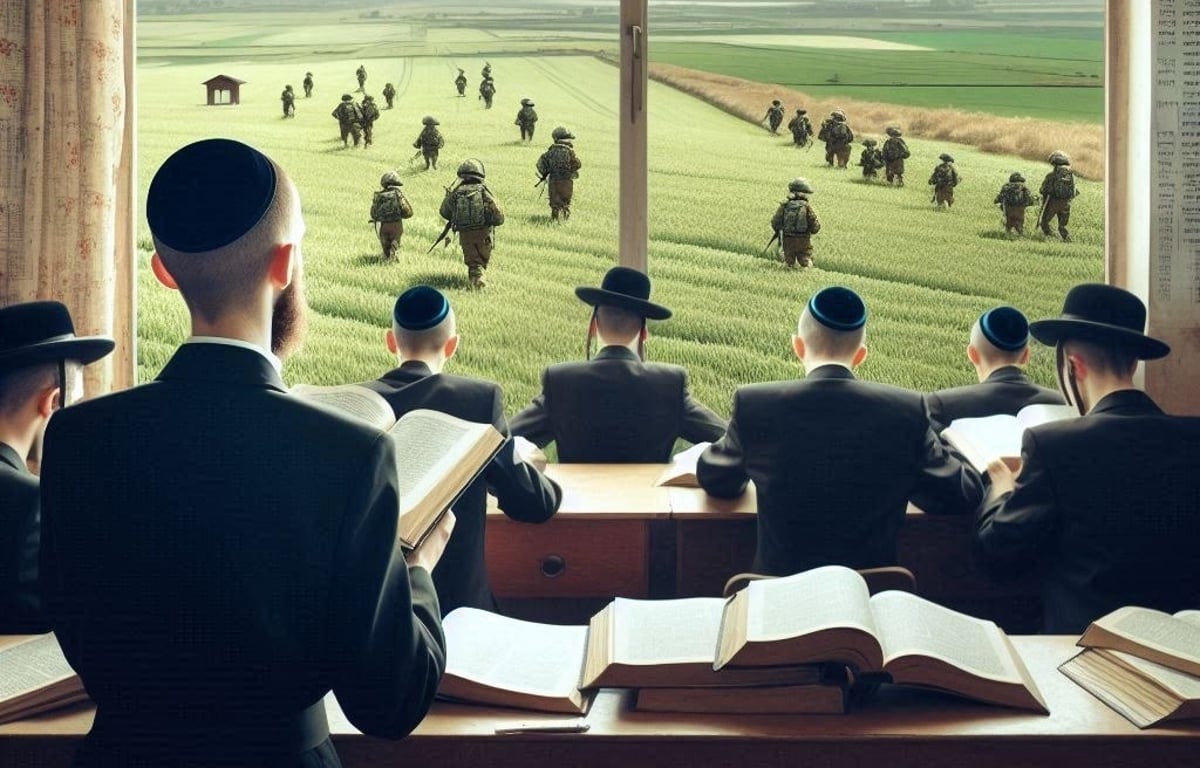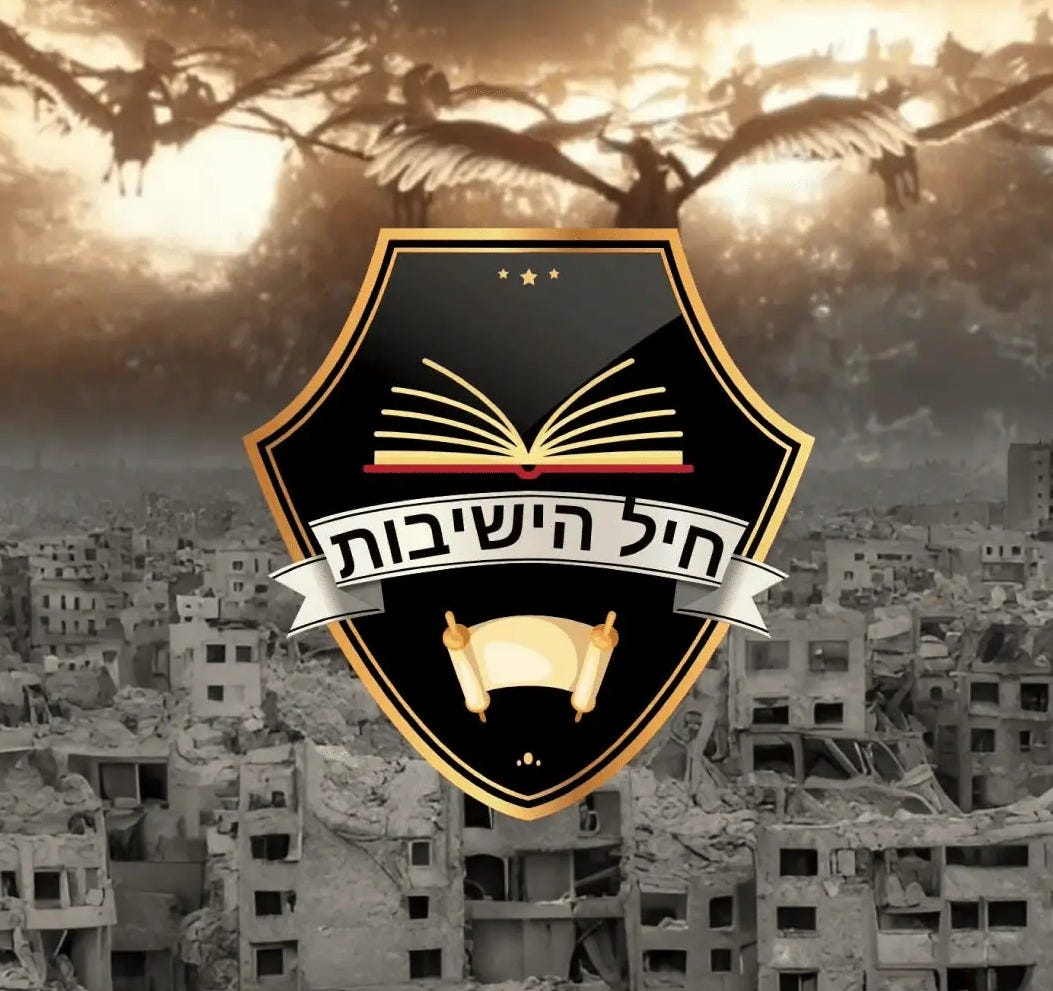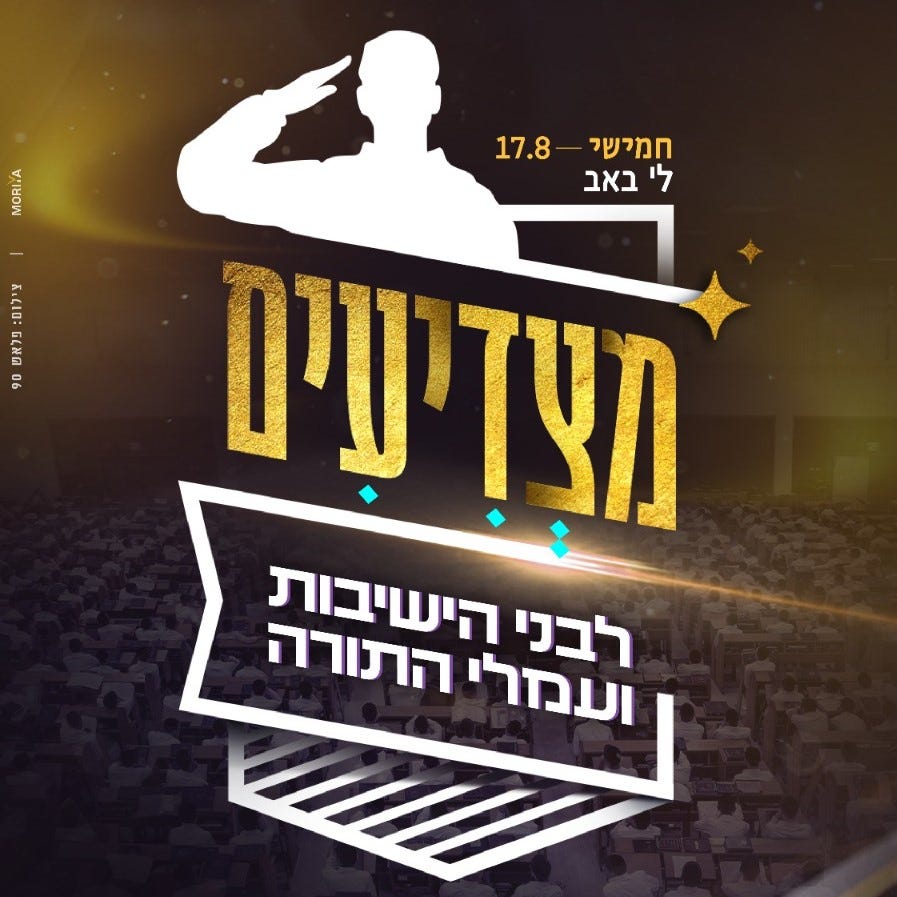Torah vs. Daas Torah, again
Who are the Real Warriors?
Who is fighting and winning this war?
The conventional perspective is that the soldiers are fighting it, of course, just like in every war around the world. From a religious perspective, there is also a Divine plan and the potential for special Divine assistance, which in turn depends on the merit of the nation. And this merit is created by a broad picture of the religious and moral state of the nation, not by what a small group of people is doing in a particular aspect of their bein adam l’Makom at a particular moment in time. But the actions of the IDF are the most significant element.
From a charedi non-rationalist perspective, however, the above is false, even heretical. Everything depends entirely on Hashem, and Hashem reacts entirely to the spiritual merits of the nation. Which according to the charedi perspective, generally further means specifically the Torah study of the charedi community.
Some charedim might talk about it being a joint effort between the soldiers and the yeshiva students. But even then, they claim that the soldiers are only succeeding based on the merits of the yeshiva students. And more often, they just mean that the soldiers have to do “hishtadlus,” which means that they have to just do a charade and go through the performance of doing material effort, but it’s actually the Torah study of yeshiva students which is accomplishing the real victories. It’s the yeshiva students that deserve an army insignia and the military salute, as you can see in these images that appear online:
Thus far Daas Torah. Now let’s see what Torah has to say.
First of all, let’s point out something that ought to be obvious. The Torah talks a lot about going to war. And it never, ever mentions people learning in yeshivah. Somehow many people blind themselves to this obvious point.
Still, let’s say that this is not definitive. Maybe the people that the Torah describes as going to war are not actually the ones accomplishing the victory? Maybe they are just doing the performative hishtadlus, and it’s really the unmentioned Torah students who are accomplishing it?
Well, let’s see what the Torah has to say about the people who went to war. David HaMelech eulogizes two of them: Shaul and Yonatan. Here is what he has to say about them:
מִדַּ֣ם חֲלָלִ֗ים מֵחֵ֙לֶב֙ גִּבּוֹרִ֔ים קֶ֚שֶׁת יְה֣וֹנָתָ֔ן לֹ֥א נָשׂ֖וֹג אָח֑וֹר וְחֶ֣רֶב שָׁא֔וּל לֹ֥א תָשׁ֖וּב רֵיקָֽם׃
שָׁא֣וּל וִיהוֹנָתָ֗ן הַנֶּאֱהָבִ֤ים וְהַנְּעִימִם֙ בְּחַיֵּיהֶ֔ם וּבְמוֹתָ֖ם לֹ֣א נִפְרָ֑דוּ מִנְּשָׁרִ֣ים קַ֔לּוּ מֵאֲרָי֖וֹת גָּבֵֽרוּ׃
From the blood of slain, from the fat of warriors—the bow of Jonathan never turned back; the sword of Saul never withdrew empty. Saul and Jonathan, beloved and cherished, never parted in life or in death. They were swifter than griffon vultures, they were stronger than lions.
David HaMelech praises their strength and their accomplishments in battle. Obviously, this means that their accomplishments held genuine, innate significance. The battles were won because of these accomplishments, not because of unmentioned people in yeshiva.
The verses themselves are explicit enough, but Malbim elaborates further:
ורצה לומר שלפעמים יפלו גבורים מצד חסרון הלימוד והאומנות של המלחמה וזה לא היה פה, שהיו מלומדי מלחמה זה בקשתו וזה בחרבו.
…It is saying that sometimes warriors fall because of a deficiency in their study and training in the art of war, and such was not the case here, because they were learned in the art of war - this one with his bow, and this one with his sword.
They were students - but not yeshiva students. They spent a long time studying the art of war. And that is why they were successful. It wasn’t due to the Torah study done by them or anyone else. It was because they were trained fighters.
Torah is very different from Daas Torah. No wonder they don’t learn Tanach in yeshivos.
A full list of my posts on the topic of IDF service is at Torah and Army: The Big Index






You should listen to this podcast with Rav Moshe Taragin https://overcast.fm/+AAede9LlYps. He is a long time Ram in the hesder yeshiva in Gush Etzion and is a proud religious Zionist. And yet, he doesn’t feel the need to bash Haredim, express hate for them etc. In fact he says that he respects them and that they are doing something that his community (the dati leumi community) isn’t by focusing exclusively on Torah. He has a much healthier perspective on Haredim than what is expressed here.
Rabbi Slifkin, you make some good points, but you also make quite a few mistakes which nullify your main message.
First of all, what is your main message? You pull quite the hook and sinker here. First you prove from pesukim that Shaul and Yonasan trained for battle. Then you extrapolate from there A. that the view of chareidim of hishtadlus being a smokescreen is incorrect. B. that it was not the zechus of Torah that assisted them in war. Although you start with A, I believe your main message is B. But both of these messages fail. A. fails because the fact that Shaul and Yonosan did hishtadlus does not in any way disprove the chareidi view of hishtadlus. I am mystified that anybody could think that it does. The chareidi view of hishtadlus is that it must be performed. That includes military training. But the real power behind a victory is Hashem, based on the spiritual status of the nation. So the pesukim speak in no way to the chareidi viewpoint. In fac they are entirely irrelevant.
B. fails much harder, because the pesukim are not talking about the merit of Torah. We know about the merit of Torah from many other places.
So your evidence completely fails to support either of your messages.
You also make a mistake when you say the Torah discusses battle, but not yeshivos. This only makes sense if one accepts the תורה שבכתב but not the תורה שבעל פה, which discusses yeshivos in hundreds of places. But surely we are not dealing with Tzedukkim or Karaim here! The Torah discusses yeshivos ad nauseum, and speaks in places about the merit of Torah protecting the Jewish people. See here. https://irrationalistmodoxism.substack.com/p/does-torah-protect